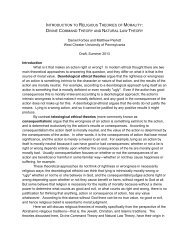Introduction to Religious Theories of Morality
Create successful ePaper yourself
Turn your PDF publications into a flip-book with our unique Google optimized e-Paper software.
moral philosophy from the Abrahamic traditions, and they are particularly influential in moral and<br />
ethical thought in Western culture.<br />
Divine Command Theory<br />
There are two main theoretical approaches <strong>to</strong> religious morality that differ significantly<br />
from typical deon<strong>to</strong>logical or consequentialist approaches. One is called Divine Command<br />
Theory (DCT). According <strong>to</strong> DCT the moral value <strong>of</strong> a human action is extrinsic <strong>to</strong> both the<br />
action and <strong>to</strong> the consequences <strong>of</strong> the action for human beings. Instead, the moral value <strong>of</strong> an<br />
action is intrinsic <strong>to</strong> God’s will regarding that action. If God wills that one should perform an<br />
action, then this gives the action positive moral value and hence makes it morally right, and if<br />
God wills that one should not perform an action, then this gives the action negative moral value,<br />
and hence makes it morally wrong. In other words, all moral value is situated in God’s will, and<br />
without God’s will no action or consequence <strong>of</strong> an action could have any moral value. It is<br />
God’s will that creates moral right and wrong, and so without God’s will there would be no such<br />
thing as good or evil <strong>of</strong> any sort.<br />
From a religious or spiritual perspective, there are some compelling aspects <strong>to</strong> DCT that<br />
make it plausible. God is crea<strong>to</strong>r <strong>of</strong> the universe, and hence everything that exists owes its<br />
reality <strong>to</strong> God. Why should morality be any different? From this perspective it is reasonable <strong>to</strong><br />
think <strong>of</strong> morality as another <strong>of</strong> God’s creations. Moreover, God is usually conceived <strong>to</strong> be<br />
omnibenevolent—that is, wholly good. Again, it makes sense <strong>to</strong> think <strong>of</strong> God as the source <strong>of</strong><br />
all that is good, including the standards for what counts as good and, by that <strong>to</strong>ken, what counts<br />
as bad as well. Finally, God as the crea<strong>to</strong>r is the ultimate power guiding the universe, and so<br />
God is the only being who would have the authority and power <strong>to</strong> promulgate and fully enforce<br />
moral law through judgment. Hence it makes sense <strong>to</strong> think <strong>of</strong> God’s will as law, particularly for<br />
morality.<br />
It is important <strong>to</strong> carefully distinguish DCT from deon<strong>to</strong>logical and consequentialist<br />
approaches. DCT specifically locates moral value in God’s will and choice. Hence it is very<br />
different from deon<strong>to</strong>logical or consequentialist reasoning about ethics. For example, consider<br />
the Biblical commandment “You shall not kill.” Why is killing wrong? Suppose we say that<br />
killing is wrong because it causes harm <strong>to</strong> the victim and those who care about him, and it also<br />
harms the perpetra<strong>to</strong>r because she becomes more vicious and morally deficient by taking such<br />
actions. Then God issues the commandment because killing as an action has bad<br />
consequences for those affected by the act. This is a consequentialist interpretation <strong>of</strong> the<br />
commandment against killing because the wrongness <strong>of</strong> killing is intrinsic <strong>to</strong> the consequences<br />
<strong>of</strong> the action. Thus even if God did not issue the commandment, we would still know that killing<br />
would be morally wrong (or, more precisely, it would still be wrong, whether we knew it or not)<br />
because its results are morally bad. This leaves God’s commandment out <strong>of</strong> the equation, and<br />
so this interpretation is inconsistent with DCT.<br />
Suppose instead that we say killing is wrong because it is a depraved and morally ugly<br />
action. Then God issues the commandment against killing because <strong>of</strong> something intrinsically<br />
bad about the act <strong>of</strong> killing. This is a deon<strong>to</strong>logical interpretation <strong>of</strong> the commandment against<br />
killing. Thus even if God did not issue the commandment, killing would still be morally wrong<br />
because <strong>of</strong> the intrinsic character <strong>of</strong> the action, which is what makes it morally bad. So this<br />
interpretation is also inconsistent with DCT.



